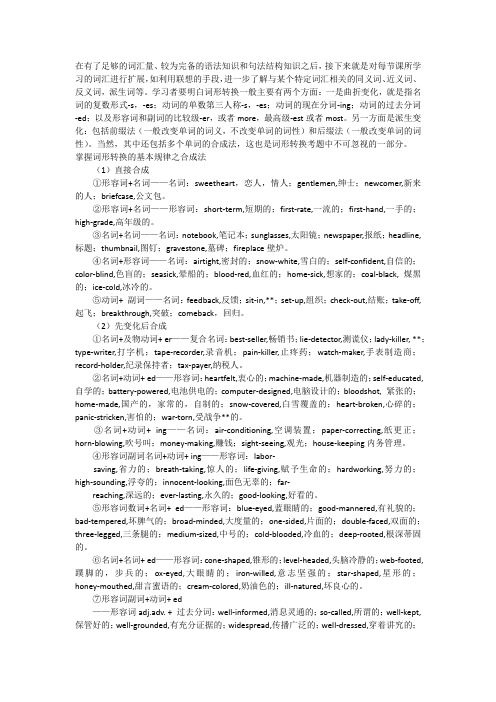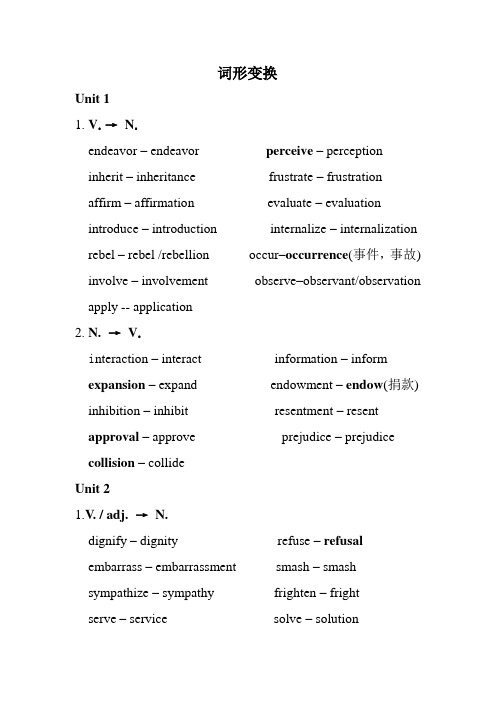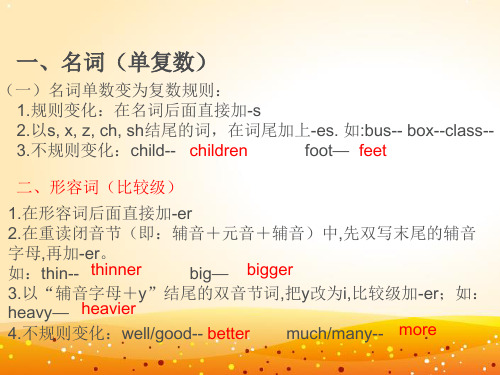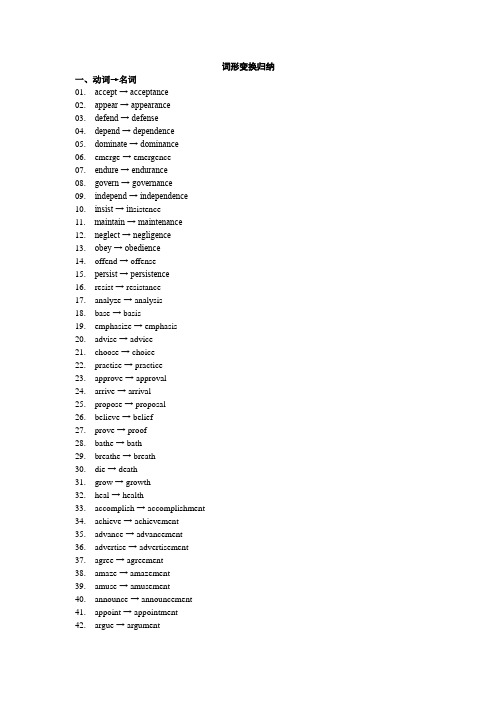词形变换
- 格式:ppt
- 大小:194.00 KB
- 文档页数:3

在有了足够的词汇量、较为完备的语法知识和句法结构知识之后,接下来就是对每节课所学习的词汇进行扩展,如利用联想的手段,进一步了解与某个特定词汇相关的同义词、近义词、反义词,派生词等。
学习者要明白词形转换一般主要有两个方面:一是曲折变化,就是指名词的复数形式-s,-es;动词的单数第三人称-s,-es;动词的现在分词-ing;动词的过去分词-ed;以及形容词和副词的比较级-er,或者more,最高级-est或者most。
另一方面是派生变化:包括前缀法(一般改变单词的词义,不改变单词的词性)和后缀法(一般改变单词的词性)。
当然,其中还包括多个单词的合成法,这也是词形转换考题中不可忽视的一部分。
掌握词形转换的基本规律之合成法(1)直接合成①形容词+名词——名词:sweetheart,恋人,情人;gentlemen,绅士;newcomer,新来的人;briefcase,公文包。
②形容词+名词——形容词:short-term,短期的;first-rate,一流的;first-hand,一手的;high-grade,高年级的。
③名词+名词——名词:notebook,笔记本;sunglasses,太阳镜;newspaper,报纸;headline,标题;thumbnail,图钉;gravestone,墓碑;fireplace壁炉。
④名词+形容词——名词:airtight,密封的;snow-white,雪白的;self-confident,自信的;color-blind,色盲的;seasick,晕船的;blood-red,血红的;home-sick,想家的;coal-black, 煤黑的;ice-cold,冰冷的。
⑤动词+ 副词——名词:feedback,反馈;sit-in,**;set-up,组织;check-out,结账;take-off,起飞;breakthrough,突破;comeback,回归。
(2)先变化后合成①名词+及物动词+ er——复合名词:best-seller,畅销书;lie-detector,测谎仪;lady-killer, **;type-writer,打字机;tape-recorder,录音机;pain-killer,止疼药;watch-maker,手表制造商;record-holder,纪录保持者;tax-payer,纳税人。

高中英语词形变换汇总(1)直接加-s.如:book→books, pen→pens, ruler→rulers, watch →watches, phone→phones.(2)以 s, x, ch, sh结尾的加-es.如:bus→buses, box→boxes,brush→brushes, watch→watches.(3)以辅音字母加 y结尾的改 y为 i再加-es.如:family→families,baby→babies.(4)以元音字母加 y结尾的直接加-s.如:boy→boys, toy→toys.(1)有些名词的复数形式是不规则的,必须熟记。
如:child→children,foot→feet, tooth→teeth, goose→geese, mouse→mice, man →men, woman→women等。
(2)单复数同形的名词。
如:fish(鱼),deer(鹿),sheep(绵羊),works(工厂),means(方法)等。
在动词后面加-s。
如:play→plays, like→likes, do→does, teach →teaches.在动词词尾加-ed。
如:clean→cleaned, visit→visited, work→worked, look→looked.有些动词的第三人称单数形式是规则的,如go→goes, do→does,see→sees等;有的不规则,如have→has。
不管这些形式是否规则,动词的第三人称单数形式在句子中都要当谓语动词用。
's所有格:一般情况在词尾加's。
如:Tom's book汤姆的书。
以s 结尾的复数名词直接在词尾加's。
如:Teachers' Day教师节。
以s 结尾的人名加's。
如:James' book詹姆斯的书。
并列名词的所有格在最后一个名词的词尾加's。

词形变换Unit 11. V.→N.endeavor – endeavor perceive– perception inherit – inheritance frustrate – frustration affirm – affirmation evaluate – evaluation introduce – introduction internalize – internalization rebel – rebel /rebellion occur–occurrence(事件,事故) involve – involvement observe–observant/observation apply -- application2. N.→V.i nteraction – interact information – inform expansion– expand endowment – endow(捐款) inhibition – inhibit resentment – resent approval– approve prejudice – prejudice collision– collideUnit 21.V. / adj.→N.dignify – dignity refuse –refusal embarrass – embarrassment smash – smash sympathize – sympathy frighten – frightserve – service solve – solutionglimpse – glimpse surrender – surrender intimate –intimacy absurb –absurdity ridiculous – ridicule mature – maturity miraculous – miracle terrible – terror proud – pride2. adj.→V.quick –quicken full – fillsad – sadden short – shorten sure – assure/ensure weak – weaken wide – widen sharp – sharpen strong –strengthen thick – thicken high – heighten long –lengthen cold – cool low – lowerangry – anger hot – heatdark – darken silent – silence light – lightenUnit 31.V. →N.plunge –plunge contact – contact advertise – advertisement enroll – enrollment require – requirement inquire –inquiry replace – replacement market – marketingfail – failure incorporate – incorporation guarantee –guarantee specialize – specialization 2.N.→V.subscription – subscribe performance – perform delivery – deliver donation – donate consumer – consume entitlement – entitle manufacturer– manufacture equipment – equip computer –computeUnit 41.V. →N.possess – possession endure –endurance penetrate – penetration encounter – encounter retire – retirement suspect – suspect/suspicion abandon – abandonment incline – inclination explore – exploration recover – recoverywarn – warning proceed – proceeding fascinate – fascination form –formation(形成) 2.adj.→N.anxious – anxiety miserable – misery dense – density instinctive – instinct familiar –familiarity essential –essence immense – immensity stupid –stupiditysudden – sudden invisible – invisibility generous – generiosity productive – productivity fond –fondness equivalent –equivalency Unit 51.V.→N.handle – handle charge – charge accuse –accusation suppose –supposition disagree – disagreement mix – mixture refute –refutation provoke –provocation commit – commitment diverge –divergence 2.N./ adj.→V.trial– try prosecution – prosecute mugging –mug alleged – allege guard – guard sickening – sicken preacher – preach elevated – elevate torn – tear unbearable – bear accomplishment – accomplish excitable – excite coincidence –coincide forgery – forgeUnit 61.V. →N.vote – vote assume –assumption depend – dependence risk – riskobject – objection recreate – recreation declare – declaration obscure –abscurity describe – description annoy –annoyance intimidate –intimidation resistant – resistance fragrant –fragrance reluctant – reluctance persisitent –persistence competent – competence 2.N./ adj.→V.detective – detect relative – relate doubt – doubt difference – differ display – display stress – stress breath – breathe disgusting – disgust narrator – narrate switch – switch ignorant – ignorance arrogant – arrogance distant – distance significant – significance Unit 81.V. →N.devastate – devastation exhilarate– exhilaration conform –conformity procreate – procreation invoke –invocation sustain –sustenance project – projection derive –derivation criticize – criticism restore –restoration2. N. →V.contortion – contort rationalization – rationalize transgression – transgress condemnation– condemn abortion – abort emphasis – emphasize seduction –seduce gratification – gratify destruction – destroy indulgence – indulge obligation – oblige motivation – motivate causation – cause survival – survive2.inhale(吸气) – exhale(呼气)interior(内部的) – exterior(外部的)internal(内在的)-- external(外在的)Unit 91.V. →N.float – floatation exasperate– exasperation loathe – loathing infuriate– infuriation stretch – stretch mock – mockerystrike – stroke decorate – decoration/decorative admire – admirationmanage – management/ unmanageablerolling hills 起伏的山坡lingering painimpulse – impulsive exhilarate -- exhilarating。


词形变换归纳一、动词→名词01. accept → acceptance02. appear → appearance03. defend → defense04. depend → dependence05. dominate → dominance06. emerge → emergence07. endure → endurance08. govern → governance09. independ → independence10. insist → in sistence11. maintain → maintenance12. neglect → negligence13. obey → obedience14. offend → offense15. persist → persistence16. resist → resistance17. analyze → analysis18. base → basis19. emphasize → emphasis20. advise → advice21. choose → choice22. practise → practice23. approve → approval24. arrive → arrival25. propose → proposal26. believe → belief27. prove → proof28. bathe → bath29. breathe → breath30. die → death31. grow → growth32. heal → health33. accomplish → accomplishment34. achieve → achievement35. advance → advancement36. advertise → advertisement37. agree → agreement38. amaze → amazement39. amuse → amusement40. announce → announcement41. appoint → appointment42. argue → argument43. astonish → astonishment44. develop → development45. disappoint → disappointment46. employ → employment47. encourage → encouragement48. enjoy → enjoyment49. enroll → enrollment50. govern → government51. improve → improvement52. invest → investment53. judge → judg(e)ment54. manage → management55. move → movement56. state → statement57. treat → treatment58. act → action59. add → addition60. apply → application61. assume → assumption62. celebrate → celebration63. construct → construction64. consume → consumption65. contribute → contribution66. cooperate → cooperation67. describe → description68. devote → devotion69. educate → education70. explain → explanation71. found → foundation72. graduate → graduation73. imagine → imagination74. imply → implication75. indicate → indication76. inform → information77. intend → intention78. invite → invitation79. isolate → isolation80. liberate → liberation81. limit → limitation82. occupy → occupation83. operate → operation84. oppose → opposition85. organize → organization86. prepare → preparation87. produce → production88. pronounce → pronunciation89. realize → realization90. relax → relaxation91. satisfy → satisfaction92. separate → separation93. suggest → suggestion94. tempt → temptation95. translate → translation96. conclude → conclusion97. confuse → confusion98. decide → decision99. discuss → discussion 100. exclude → exclusion 101. express → expression 102. impress → impression 103. include → inclusion 104. oppress → oppression 105. permit → permission 106. possess → possession 107. proceed → procession 108. build → building109. mean → meaning110. discover → discovery 111. recover → recovery 112. behave → behavior 113. fail → failure114. forgive → forgiveness 115. identify → identity 116. know → knowledge 117. major → majority118. marry → marriage119. pass → passage120. press → pressure121. speak → speech122. succeed → success 123. urge → urgency124. vary → variety125. weigh → weight二、形容词→动词01. able → enable02. rich → enrich03. sure → ensure04. long → lengthen05. strong → strengthen06. high → heighten07. broad → broaden08. soft → soften09. weak → weaken10. wide → widen三、名词→形容词01. anger → angry02. cloud → cloudy03. dirt → dirty04. friend → friendly05. fun → funny06. heart → hearty07. hunger → hungry08. health → healthy09. luck → lucky10. noise → noisy11. rain → rainy12. salt → salty13. sleep → sleepy14. snow → snowy15. sun → sunny16. taste → tasty17. time → timely18. wind → windy19. worth → worthy20. beauty → beautiful21. care → careful22. colo(u)r → colo(u)rful23. dread → dreadful24. fear → fearful25. harm → harmful26. help → helpful27. joy → joyful28. law → lawful29. power → powerful30. success → successful31. thank → thankful32. use → useful33. wonder → wonderful34. youth → youthful35. anxiety → anxious37. glory → glorious38. mountain → mountainous39. mystery → mysterious40. nerve → nervous41. poison → poisonous42. atom → atomic43. basis → basic44. class → classic / classical45. economy → economic / economical46. electron → electronic47. history → historic / historical48. scene → scenic49. science → scientific50. accident → accidental51. benefit → beneficial52. biology → biological53. chemistry → chemical54. digit → digital55. education → educational56. globe → global57. habit → habitual58. industry → industrial59. logic → logical60. nation → national61. nature → natural62. occasion → occasional63. person → personal64. ration → rational65. region → regional66. season → seasonal67. society → social / sociable68. technology → technological69. tradition → traditional70. activity → active71. effect → effective72. defense → defensive73. difference → different74. intelligence → intelligent75. ability → able76. capability → capable77. hono(u)r → hono(u)rable78. horror → horrible79. reason → reasonable81. fool → foolish82. fortune → fortunate83. wool → woolen84. amazement → amazing / amazed85. astonishment→ astonishing/astonished86. depression → depressing / depressed87. excitement → exciting / excited88. interest → interesting / interested89. surprise → surprising / surprised90. pleasure → pleasing / pleased四、形容词→名词01. active → activity02. brave → bravery03. careful → carefulness04. careless → carelessness05. cautious → caution06. cruel → cruelty07. dark → darkness08. deep → depth09. difficult → difficulty10. free → freedom11. high → height12. happy → happiness13. ill → illness14. long → length15. real → reality16. sad → sadness17. safe → safety18. strong → strength19. true → truth20. wide → width五、动词→名词(表示人)01. act → actor / actress02. wait → waiter / waitress03. employ → employer / employee04. interview → interviewer / interviewee05. train → trainer / trainee06. advise → adviser07. analyze → analyst08. apply → applicant09. assist → assistant11. clean → cleaner12. collect → collector13. create → creator14. dance → dancer15. detect → detective16. discover → discoverer17. direct → director18. drive → driver19. edit → editor20. educate → educator21. farm → farmer22. invent → inventor23. invest → investor24. learn → learner25. manage → manager26. organize → organizer27. participate → participant28. play → player29. produce → producer30. run → runner31. serve → servant32. sing → singer33. speak → speaker34. swim → swimmer35. teach → teacher36. translate → translator37. travel → traveler38. type → typist39. visit → visitor40. win → winner六、名词单、复数(特殊)01. datum → data02. medium→ media03. phenomenon → phenomena04. belief → beliefs05. chief → chiefs06. roof → roofs07. proof → proofs08. key → keys09. toy → toys10. German → Germans11. hero → heroes12. Negro→ Negroes13. potato → potatoes14. tomato → tomatoes15. foot → feet16. tooth → teeth17. mouse → mice18. child→ children19. means → means20. sheep → sheep。

英语词形变换技巧
英语词形变换是英语学习中不可避免的一部分,常见的词形变换有名词、动词、形容词和副词等。
以下是几种常见的词形变换技巧:
1. 加后缀:通过加上不同的后缀来形成不同的词性。
例如,将名词“experience”加上后缀“-ive”,就可以构成相应的形容词“experiential”;将名词“inform”加上后缀“-ation”,就可以构成相应的动词“information”。
2. 去掉后缀:比如把形容词“active”中的“-ive”去掉,就可以得到相应的名词“activity”。
3. 变化词尾:有些词原词尾存在一些规律性的变化,例如,把名词“child”变为复数形式时,只需要改变末尾的“-d”为“-ren”,就可以得到复数“children”。
4. 变化拼写:有些词在变化词形时,可能需要变化单词中的拼写。
例如,将形容词“happy”变为副词时,要把“-y”改为“-ily”,得到“happily”。
5. 不规则变化:有一些词不遵循上述规则,需要记忆其不规则的变化形式,例如,将动词“go”变为过去式时,要变成“went”。
总之,在学习英语词形变换时,需要掌握各种词形变换的规则和技巧,并多加练习和记忆,提高自己的英语语言水平。
英语单词词性转换的基本规律一词性变换的一般的规律1.动词v.→名词n.(a)词形不变,词性改变 work, study, water, plant等可以用作动词工作,学习,浇水,种植,也可以用作名词工作,学习,水,植物.b一些动词在词尾加上-er或-or之后就变成了表示"某一类人"的名词例如:work—worker, teach—teacher, sing—singer, jump—jumper,play—player, learn—learner,visit—visitor, invent—inventor,collect—collector等.注意:1以不发音的e结尾的动词,在词尾加-r.例如:drive—driver, write—writer等.2以重读闭音节结尾,且末尾只有一个辅音字母的动词,应双写末尾的辅音字母,再加-er例如:run—runner, win—winner,begin—beginner等.c在动词词尾加上-ment 变成名词例如:achieve—achievement 成就 advertise—advertisement广告agree—agreement disagree—disagreementamuse—amusement 娱乐 improve—improvement争吵commit奉献—commitment develop—development 发展depart—department 局,部 govern统治—government政府manage—management 管理 equip—equipment 装备有些单词比较特殊,需把动词后的e去掉再加ment.例如:argue—argument争论d在动词词尾加上-tion/sion变成名词例如: attract—attraction; instruct—instruction;invent—invention discuss—discussion;express—expression educate—education;graduate—graduation; operate—operation 去e再加"ion"compete—competition; organize—organization 把e改成其他字母再加"tion"decide—decision conclude—conclusion 把de改为s再加"ion"describe—description描写,描绘这是特例,不规则变化e在动词词尾加上-ance变成名词例如: appear—appearance 外貌;出现 perform—performance 演出accept—acceptance 接受f在动词词尾加-ing变成名词方法与动词变为现在分词的方法相同例如: meet—meeting build—building wait—waiting bathe—bathing say—saying谚语 mean—meaningend —ending train —training wash—washing 注意:以重读闭音节结尾,且末尾只有一个辅音字母的动词,应双写末尾的辅音字母,再加-ing如:swim—swimming shop—shopping begin—beginningg其他一些比较特殊的变化例如: Beg乞讨—beggar乞丐 behave行为举止—behaviorknow知道—knowledge知识 fly—flight 飞行heat 加热—heat热量 hit 撞击—hit 轰动一时的人或物,碰撞mix 混合—mixture混合物 press按,压—pressure压力sit坐—seat 座位 succeed—success成功tour—tour旅游/ tourist 游客2.动词v.→形容词adj.a动词后面加able,以e结尾的动词则去e加able,表示具有此性质,特点或属性.例如: afford-affordable;love-lovableb动词后面加ed,以e结尾的动词则直接加d,表示被动性的属性或特点.例如: scatter-scattered use-usedc不规则的动词则必须记忆,记住其过去分词形式.规律不大,意义同b.3.名词n.→形容词adj.a在名词后面加-y可以变成形容词尤其是一些与天气有关的名词例如: rain—rainy, cloud—cloudy, wind—windy, snow—snowy,health—healthy, luck—lucky,anger—angry guilt—guilty内疚的 tourist—touristy游客多的 , salt 盐—salty 咸的silk丝绸—silky丝绸般的, sleep—sleepy 昏昏欲睡的注意:1如果以重读闭音节结尾,且词尾只有一个辅音字母,这时应双写辅音字母再加"-y". 如: sun—sunny, fun—funny, fog—foggy有雾的, fur—furry毛皮的2少数以不发音的e结尾的名词变为形容词时,应去掉e再加"-y".如: noise—noisy, ice—icy, shine—shiny发亮的, taste口味—tasty甜的b名词后面加-ed,以e结尾的直接加d.例如: spot斑点—spotted有斑点的; talent—talented 有天赋的organize—organized 有组织的; balance—balanced平衡的c一些抽象名词在词尾加-ful可以变为形容词例如:care—careful, thank—thankful, help—helpful,use—useful, meaning—meaningfuld在名词后加-less构成含有否定意义的形容词例如:care—careless粗心的, use—useless无用的hope—hopeless没希望的,home—homeless无家可归的e一些以-ce结尾的名词,把-ce改为-t变成形容词例如: difference—different, silence—silent, confidence—confidentf.在名词后加-ly变为形容词例如: friend—friendly, love—lovely, live---livelyg.在名词后加-ous变为形容词例如: danger—dangeroush名词后面加-al变为形容词例如: music—musical; medicine—medical 这个比较特殊i名词后面加-able变为形容词,如果以e结尾就去e再加"-able".例如: adjust—adjustable 可调整的 value—valuable有价值的j名词后面加-en变成形容词例如: wood—wooden 木制的 wool—woolen 羊毛的k一些表示国家的名词可以在词尾加-ese, -ish或-n构成表示国籍,语言的形容词例如:China—Chinese, Japan—Japanese, England—English,America—American, India—Indian, Australia —Australian 注意Canada—Canadian4.形容词adj.→副词adv.▲一般在形容词的词尾加-ly可以变成副词例如: quick—quickly, slow—slowly, loud—loudly, sudden—suddenly 等但是,以下几点值得注意:a 一些以"辅音字母+y"结尾的形容词,要把y改为i再加-ly例如: happy—happily, angry—angrily, lucky—luckily, heavy—heavily, noisy—noisilyb 有些以-ble或-le结尾的形容词,去掉e加-y例如:possible—possibly, terrible—terriblyc少数以e结尾的形容词,要去掉e再加-ly例如: true—truly但绝大多数以e结尾的形容词仍然直接加-ly 例如: polite—politely, wide—widelyd以-l结尾的形容词变为副词时要在词尾加-ly,以-ll结尾的才在词尾只加-y.例如: usual—usually, careful—carefully, useful—usefullyfull—fully 以-ll结尾的才只加y二 . 派生:指由一个词根加上前缀和或后缀构成另一个词的构词形式;1. 前缀:一般而言,前缀只改变词的含意,并不改变词的词性,有些前缀如en- , under- 等却使原词改变了词性,如 force n 力量— enforce v 加强;rich adj 富有—enrich v 使富裕;line n 线—underline v 在……之下画线;①表示否定意义的前缀,往往使原词变成它的反义词;前缀含义词根派生词dis- 不 like 喜欢 dislike 不喜欢un- 不 fair 公平 unfair 不公平il- 不;无 legal 合法的 illegal 非法的in- 不;非 correct 正确的 incorrect 不正确的im- 非 possible 可能的 impossible 不可能的ir- 不;非 regular 规则的 irregular 不规则的non- 无;非 smoker 烟民 non-smoker 不吸烟者en- 使 courage 勇气 encourage 鼓励fore- 前;预先 head 头 forehead 前额inter- 在……之间 national 国家的 international 国际的kilo- 千 meter 米 kilometer 千米micro- 微量的;微小的computer 计算机 microcomputer 微机mid- 在…中间 autumn 秋天 mid-autumn 中秋mis- 错误地 understand 理解 misunderstand 误解over- 在…上,过分;超过 head 头 overhead 在头顶上的re- 再;重;又 build 修建 rebuild 重建seimi- 半 circle 圆 semicircle 半圆2. 后缀:通常情况下,后缀不但改变词,还改变词性,常见的后缀有动词后缀、副词后缀、形容词后缀和名词后缀;①动词后缀:后缀含义词根派生词-en 变得… wide 宽的 widen 加宽;变宽-ify 使… beauty 美 beautify 使漂亮-ize/ise 使… real的 realize 实现②副词后缀:后缀含义词根派生词-ly 在…状态中 happy 高兴;幸福 happily 高兴地;幸福地-ward 朝…方向/地方 back 后 backward 向后;朝后③形容词后缀:后缀含义词根派生词-able/-ible 可…的;能…的 comfort 舒服 comfortable 舒适的-al/-ial 属于…的;有…特点 practice 练习 practical 实际的;可行的-ed 有…特性的 interest 兴趣 interested 感兴趣的-ful 充满…的 harm 伤害;损伤 harmful 有害的;致伤的-ish 有…属性的 self 自己 selfish 自私的-ive 有…倾向的 create 创造 creative 创造性的④名词后缀:后缀含义词根派生词-ance/-ence 指行为、状态 perform 表演 performance 演出;表演-dom 指性质、状态 free 自由的 freedom 自由-er/or 指人的身份 work 工作 worker 工人-ess 指人的身份 host 招待;主持 hostess 女主人-ese 表示国籍 China 中国 Chinese 中国人-ian 指人的身份 music 音乐 musician 音乐家-ism 与主义有关的 social 社会的 socialism 社会主义。
part1 词形转换词形转换是一种语法现象,它指的是从一个词性转变为另一个词性,例如从名词转变为动词,从动词转变为形容词,或者从形容词转变为副词等等。
在中文中,词形转换可以通过增加、减少、调整词尾或者借用相关词缀来实现。
以下是一些常见的词形转换方法及示例:1.名词→动词:-增加词尾“-化”:学习→学习化-增加词尾“-离”:旅行→旅行离-增加词尾“-运”:生活→生活运2.动词→名词:-加“-者”:读→读者-加“-物”:动→动物-加“-度”:活→活度3.形容词→副词:-加“-地”:快→快地-加“-样”:美→美样-加“-乎”:高→高乎4.形容词→动词:-加“-化”:困难→困难化-加“-而”:明白→明白而5.副词→形容词:-加“-的”:亲切→亲切的-加“-似”的(感叹代词):何等→何等似的6.名词→形容词:-加“-的”:年龄→年龄的-加“-用”的:工具→工具用的-加“-性”的:有力→有力性的7.副词→名词:-加“-者”的:轻轻→轻轻者-加“-道”的:一起→一道8.动词→副词:-去掉词尾“-了”:跑了→跑-去掉表示时态的词尾:吃了→吃以上提供的只是一些常见的词形转换方法和示例,实际上词形转换还有很多其他的方式。
不同的词形转换方式可以帮助我们在表达中更加灵活和丰富,增加语言的表达能力。
在写作中,词形转换可以帮助我们避免重复使用相同的词汇,并增强句子的表达力。
因此,学会词形转换是提高写作水平的重要一步。
在实际写作中,我们可以根据文章的需要选择恰当的词形转换方式。
比如,如果需要描述一个人的动作,可以将名词转化为动词来达到更具体的表达;如果需要形容一个事物的特性,可以将名词转化为形容词来进行描述。
同时,我们也应该注意使用词形转换时要符合语法规则和语境。
总的来说,词形转换是中文中一种常见的语法现象,通过改变词的词性和词尾来实现。
掌握词形转换能够帮助我们在写作中更加灵活地表达思想,增强文章的表达力。
因此,我们在学习中文的过程中,应该注重词形转换的学习和实践,提高我们的写作水平和语言表达能力。
一 . 转化:指由一种词性转化为另一种词性的构词形式。
1. 名词转化为动词:book (n 书— v 预定);seat (n 座位— v 使就位;落座);water (n 水— v 浇水);shoulder (n 肩膀— v 负责任)2. 动词转化为名词:try (v 尝试— n 尝试);look (v 看— n 表情);swim (v 游泳— n 游泳);dream (v 做梦— n 梦)3. 形容词转化为动词:dirty (adj 脏的— v 弄脏);slow (adj 慢的— v 放慢;减慢);right (adj 正确的— v 纠正);dry (adj 干的— v 变干);free (adj 自由的— v 解放;使自由);wrong (adj 错误的— v 弄错;受委屈)4. 形容词转化为名词:dear (adj 昂贵的— n 喜欢的人/ 物);quiet (adj 寂静的— n 寂静);total (adj 全部的— n 总数)5. 其它词类的转化情况:Our classroom faces south. (south:n 南方;南面— adv 向南;朝南)6. 当英语词汇转化时,转化后的词的读音常有变化。
二 . 合成:指由两个或两个以上本身有独立含义的词合在一起组成一个有具体意义的新词的构词形式。
1. 合成形容词的常见构词形式:⑴数词+ 名词a five - year plan (五年计划);first-class products (一级品);second-hand goods (二手货);a four-word (四字成语)⑵数词+ 名词+eda three - legged bench (三条腿的登子);a one - eyed camel (一只眼的骆驼)⑶数词+ 名词+ 形容词a 20-year-old lady (一位20 岁的女士);a 1,000-metre-long bridge (一座1000 米长的桥)⑷名词+ 现在分词peace-loving (热爱和平的);meat-eating (食肉的);English-speaking (说英语的);history-making (创造历史的)⑸名词+ 过去分词heart-broken (伤心的);man-made (人造的);state-owned (国有的);water-covered (被水覆盖的)⑹形容词+ 名词+edabsent-minded (漫不经心的);blue-eyed (蓝眼睛的);good-tempered (好脾气的);kind-hearted (和善的)⑺形容词+ 现在分词bad-looking (相貌丑陋的);fine-sounding (动听的);easy-going (容易相处的)⑻形容词+ 名词short-term (短期的);part-time (兼职的);high-class (高级的);large-scale (大规模的)⑼副词+ 现在分词hard-working (努力工作的);far-reaching (深远的);ever-lasting (永恒的)⑽副词+ 过去分词well-developed (高度发达的);well-known (著名的);well-trained (训练有素的)⑾其他构词形式的合成形容词all-round (全面的);face-to-face (面对面的);thank-you (感谢的);out-of-date (过时的)2. 合成名词的常见构成形式:①名词+ 名词silkworm (蚕);footprint (脚印);newspaper (报纸);glasshouse (温室);bedroom (卧室)②名词+ 动名词handwriting (书法);sun-bathing (日光浴);sight-seeing (观光)③形容词+ 名词shorthand (速记);hotline (热线);blackboard (黑板)④动名词+ 名词waiting-room (候车室);sleeping-pill (安眠药);writing-desk (写字台);reading-room (阅览室)⑤动词+ 名词pickpocket (扒手);post office (邮局);playground (操场);break-water (防波堤)⑥动词+ 副词get-together (联欢会);break-through (突破);take-off (起飞);lookout (岗哨)⑦副词+ 动词downfall (垮台);overthrow (推翻);outbreak (爆发);income (收入;所得)⑧其他构成形式的合成名词well-being (福利);good-for-nothing (无用之人);by-product (副产品);touch-me-not (含羞草);self-improvement (自我完善);self-criticism (自我批评)注意:合成词如果出现复数形式时通常在其后加-s 或-es ,如by-products,reading-rooms,但应特别注意:passers-by,lookers-on 等词语是在其表达该词中心含义的词上加-s 或-es .3. 合成动词及其他合成词类:overthrow (推翻);sleep-walk (梦游);undergo (经历);everything (一切);furthermore (而且);forever (永远);maybe (也许)三 . 派生:指由一个词根加上前缀和(或)后缀构成另一个词的构词形式。
英语单词词性转换的基本规律一词性变换的一般的规律1.动词(v.)→名词(n.)(a)词形不变,词性改变work, study, water, plant等可以用作动词(工作,学习,浇水,种植),也可以用作名词(工作,学习,水,植物).(b)一些动词在词尾加上-er或-or之后就变成了表示"某一类人"的名词例如:work—worker, teach—teacher, sing—singer, jump—jumper, play—player, learn—learner, visit—visitor, invent—inventor,collect—collector等.注意:1)以不发音的e结尾的动词,在词尾加-r.例如:drive—driver, write—writer等.2)以重读闭音节结尾,且末尾只有一个辅音字母的动词,应双写末尾的辅音字母,再加-er例如:run—runner, win—winner,begin—beginner等.(c)在动词词尾加上-ment 变成名词例如:achieve—achievement (成就) advertise—advertisement(广告) agree—agreement disagree—disagreementamuse—amusement (娱乐) improve—improvement(争吵)commit(奉献)—commitment develop—development (发展)depart—department (局,部) govern(统治)—government(政府)manage—management (管理) equip—equipment (装备)有些单词比较特殊,需把动词后的e去掉再加ment.例如:argue—argument(争论)(d)在动词词尾加上-(t)ion/(s)ion变成名词例如: attract—attraction; instruct—instruction;invent—invention discuss—discussion;express—expression educate—education;graduate—graduation; operate—operation (去e再加"ion")compete—competition; organize—organization (把e改成其他字母再加"tion") decide—decision conclude—conclusion (把de改为s再加"ion")describe—description描写,描绘(这是特例,不规则变化)(e)在动词词尾加上-ance变成名词例如: appear—appearance (外貌;出现) perform—performance (演出)accept—acceptance (接受)(f)在动词词尾加-ing变成名词(方法与动词变为现在分词的方法相同)例如: meet—meeting build—building wait—waitingbathe—bathing say—saying(谚语) mean—meaningend —ending train —training wash—washing注意:以重读闭音节结尾,且末尾只有一个辅音字母的动词,应双写末尾的辅音字母,再加-ing如:swim—swimming shop—shopping begin—beginning(g)其他一些比较特殊的变化例如: Beg(乞讨)—beggar(乞丐) behave(行为举止)—behaviorknow(知道)—knowledge(知识) fly—flight (飞行)heat (加热)—heat(热量) hit (撞击)—hit( 轰动一时的人或物,碰撞)mix (混合)—mixture(混合物) press(按,压)—pressure(压力)sit(坐)—seat (座位) succeed—success(成功)tour—tour(旅游)/ tourist (游客)2.动词(v.)→形容词(adj.)(a)动词后面加able,以e结尾的动词则去e加able,表示具有此性质,特点或属性.例如: afford-affordable;love-lovable(b)动词后面加ed,以e结尾的动词则直接加d,表示被动性的属性或特点.例如: scatter-scattered use-used(c)不规则的动词则必须记忆,记住其过去分词形式.规律不大,意义同(b).3.名词(n.)→形容词(adj.)(a)在名词后面加-y可以变成形容词(尤其是一些与天气有关的名词)例如: rain—rainy, cloud—cloudy, wind—windy, snow—snowy,health—healthy, luck—lucky,anger—angry guilt—guilty(内疚的)tourist—touristy(游客多的) , salt (盐)—salty (咸的)silk(丝绸)—silky(丝绸般的), sleep—sleepy (昏昏欲睡的)注意:1)如果以重读闭音节结尾,且词尾只有一个辅音字母,这时应双写辅音字母再加"-y". 如: sun —sunny, fun—funny, fog—foggy(有雾的), fur—furry(毛皮的)2)少数以不发音的e结尾的名词变为形容词时,应去掉e再加"-y".如: noise—noisy, ice—icy, shine—shiny(发亮的), taste(口味)—tasty(甜的)(b)名词后面加-ed,以e结尾的直接加d.例如: spot(斑点)—spotted(有斑点的); talent—talented (有天赋的)organize—organized 有组织的; balance—balanced(平衡的)(c)一些抽象名词在词尾加-ful可以变为形容词例如:care—careful, thank—thankful, help—helpful,use—useful, meaning—meaningful(d)在名词后加-less构成含有否定意义的形容词例如:care—careless(粗心的), use—useless(无用的)hope—hopeless(没希望的),home—homeless(无家可归的)(e)一些以-ce结尾的名词,把-ce改为-t变成形容词例如: difference—different, silence—silent, confidence—confident(f).在名词后加-ly变为形容词例如: friend—friendly, love—lovely, live---lively(g).在名词后加-ous变为形容词例如: danger—dangerous(h)名词后面加-al变为形容词例如: music—musical; medicine—medical (这个比较特殊)(i)名词后面加-able变为形容词,如果以e结尾就去e再加"-able".例如: adjust—adjustable 可调整的value—valuable有价值的(j)名词后面加-en变成形容词例如: wood—wooden 木制的wool—woolen 羊毛的(k)一些表示国家的名词可以在词尾加-ese, -ish或-n构成表示国籍,语言的形容词例如:China—Chinese, Japan—Japanese, England—English,America—American, India—Indian, Australia —Australian (注意Canada—Canadian)4.形容词(adj.)→副词(adv.)▲一般在形容词的词尾加-ly可以变成副词例如: quick—quickly, slow—slowly, loud—loudly, sudden—suddenly 等但是,以下几点值得注意:(a) 一些以"辅音字母+y"结尾的形容词,要把y改为i再加-ly例如: happy—happily, angry—angrily, lucky—luckily, heavy—heavily, noisy—noisily(b) 有些以-ble或-le结尾的形容词,去掉e加-y例如:possible—possibly, terrible—terribly(c)少数以e结尾的形容词,要去掉e再加-ly例如: true—truly但绝大多数以e结尾的形容词仍然直接加-ly 例如: polite—politely, wide—widely(d)以-l结尾的形容词变为副词时要在词尾加-ly,以-ll结尾的才在词尾只加-y.例如: usual—usually, careful—carefully, useful—usefullyfull—fully (以-ll结尾的才只加y)二. 派生:指由一个词根加上前缀和(或)后缀构成另一个词的构词形式。